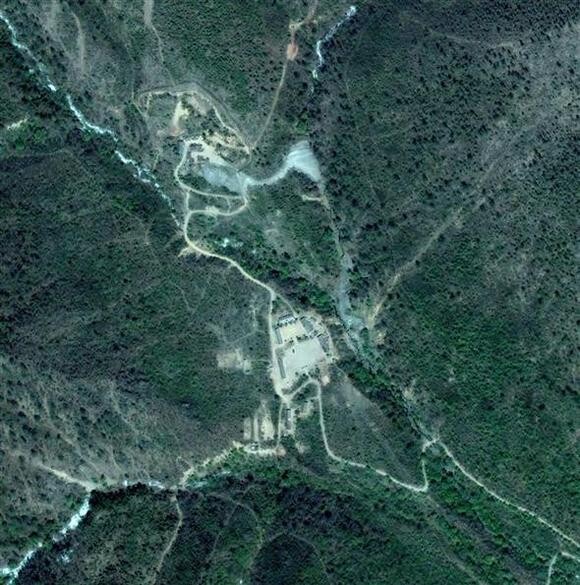hankyoreh
Links to other country sites 다른 나라 사이트 링크
S. Korea, US and Japan to hold trilateral meeting in Washington

By Choi Hyun-june, staff reporter and Park Hyun, Washington correspondent
Amid multiple warnings from North Korea that it might carry out a fourth nuclear test, the six-party talks envoys from South Korea, Japan, and the US will meet today, on Apr. 7, to discuss what measures can be taken to prevent Pyongyang from moving forward with the test. With North Korea and the three countries each following their separate courses, the nuclear issue is gradually causing tensions to rise on the Korean peninsula.
Hwang Jun-guk, representative for Korean Peninsula Peace and Security Affairs for the Ministry of Foreign Affairs and South Korea’s new envoy to the six-party talks, left the country on Apr. 6 to take part in the meeting with delegates to the six party talks from the other two countries. “In addition to military provocations, North Korea is threatening a nuclear test,” Hwang said shortly before his departure. “This meeting will be a good opportunity to reconfirm cooperation between the three countries and to devise countermeasures for the possibility of additional provocations, and in particular countermeasures for preventing such provocations from occurring.”
Hwang will participate in a trilateral meeting with the six-party delegates from the US and Japan in Washington, D.C. on Apr. 7, after which he will hold separate talks with the American and Japanese delegates, he said. Based on Hwang’s remarks, there appears to be little chance that a breakthrough for the North Korean nuclear issue will be achieved during the meeting of the delegates.
North Korea has referred to the possibility of a new nuclear test on two occasions in the space of five days, ratcheting up tensions. During a press conference that was held in New York on short notice on Apr. 4, Ri Tong-il, the North’s deputy ambassador to the UN, said that the North would have no choice but to carry out a new variety of nuclear test if the US keeps pressuring it about its missile program and human rights issues.
“North Korea has drawn a red line,” Ri said, “and it will conduct a new kind of nuclear test if the US crosses that line as it continues its provocations.” When asked what he meant by “red line,” Ri said that the North would no longer tolerate US provocations about nuclear weapons, missiles, and human rights issues.
In a statement issued by its foreign ministry on Apr. 30, North Korea also hinted that it might carry out a new kind of nuclear test in order to strengthen its “nuclear deterrence.”
In related news, Dr. Jeffrey Lewis, a noted American expert on North Korea’s nuclear program and director of the East Asia Nonproliferation Program at the James Martin Center for Nonproliferation Studies (CNS), noted on Apr. 4 that there is a high probability that the “new kind of nuclear test” referred to by North Korea could mean a simultaneous test of multiple nuclear weapons.
In an article on 38 North, a website about North Korea operated by the U.S. Korea Institute at SAIS, Lewis examined the phrasing of the original Korean statement and concluded that the “new” aspect of the test will feature “ new form of testing, as opposed to simply a new device.” [Emphasis in original.]
“The simplest explanation is that North Korea may conduct simultaneous detonations of two or more nuclear devices,” Lewis wrote.
Please direct questions or comments to [english@hani.co.kr]

Editorial・opinion
![[Column] Park Geun-hye déjà vu in Yoon Suk-yeol [Column] Park Geun-hye déjà vu in Yoon Suk-yeol](https://flexible.img.hani.co.kr/flexible/normal/500/300/imgdb/original/2024/0424/651713945113788.jpg) [Column] Park Geun-hye déjà vu in Yoon Suk-yeol
[Column] Park Geun-hye déjà vu in Yoon Suk-yeol![[Editorial] New weight of N. Korea’s nuclear threats makes dialogue all the more urgent [Editorial] New weight of N. Korea’s nuclear threats makes dialogue all the more urgent](https://flexible.img.hani.co.kr/flexible/normal/500/300/imgdb/original/2024/0424/7317139454662664.jpg) [Editorial] New weight of N. Korea’s nuclear threats makes dialogue all the more urgent
[Editorial] New weight of N. Korea’s nuclear threats makes dialogue all the more urgent- [Guest essay] The real reason Korea’s new right wants to dub Rhee a founding father
- [Column] ‘Choson’: Is it time we start referring to N. Korea in its own terms?
- [Editorial] Japan’s rewriting of history with Korea has gone too far
- [Column] The president’s questionable capacity for dialogue
- [Column] Are chaebol firms just pizza pies for families to divvy up as they please?
- [Column] Has Korea, too, crossed the Rubicon on China?
- [Correspondent’s column] In Japan’s alliance with US, echoes of its past alliances with UK
- [Editorial] Does Yoon think the Korean public is wrong?
Most viewed articles
- 1‘We must say no’: Seoul defense chief on Korean, USFK involvement in hypothetical Taiwan crisis
- 2N. Korean delegation’s trip to Iran shows how Pyongyang is leveraging ties with Moscow
- 3‘Weddingflation’ breaks the bank for Korean couples-to-be
- 4[Reportage] On US campuses, student risk arrest as they call for divestment from Israel
- 5Amnesty notes ‘erosion’ of freedom of expression in Korea in annual human rights report
- 6[Column] Park Geun-hye déjà vu in Yoon Suk-yeol
- 7Korea sees more deaths than births for 52nd consecutive month in February
- 8[Editorial] New weight of N. Korea’s nuclear threats makes dialogue all the more urgent
- 9Will NewJeans end up collateral damage in internal feud at K-pop juggernaut Hybe?
- 10[Guest essay] The real reason Korea’s new right wants to dub Rhee a founding father